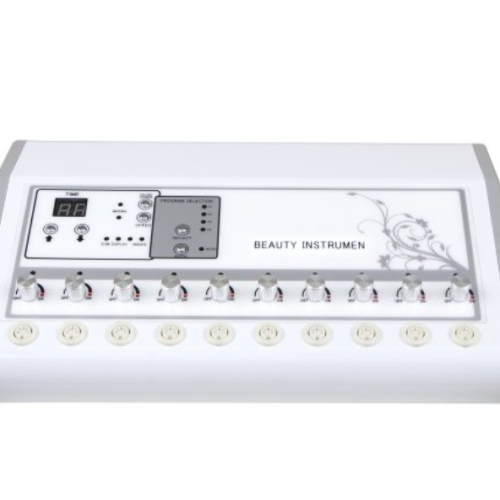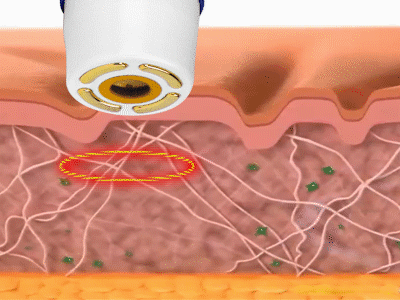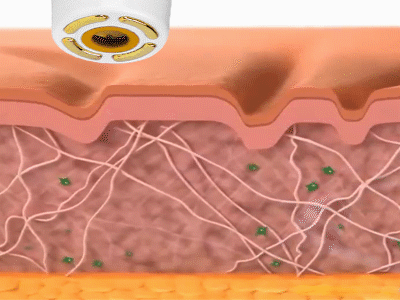
Portable Ems Units Muscle Stimulation Equipment Sale
- 4 levels of pulse intensity (Adjustable)
- 5 working modes
- 11 pairs of pads for different uses
- Fat loss + muscle training+health care
- Non-invasive & painless
The procedure for using an Electric Muscle Stimulator (EMS) slimming machine can vary depending on the specific device and treatment goals. However, here is a general outline of the steps involved in using an EMS slimming machine:
Preparation: Before using the EMS slimming machine, ensure that the skin is clean and dry. Remove any clothing or accessories that may interfere with the device’s contact with the skin.
Placement of Electrodes: Place the EMS electrodes in the target area, following the manufacturer’s instructions. The electrodes are usually connected to the machine by wires or pads and may need to be secured in place with adhesive.
Power On and Settings: Turn on the EMS slimming machine and adjust the settings according to the desired intensity level, frequency, and duration of the treatment. Some devices may have pre-set programs for specific areas or purposes.
Treatment: Begin the treatment by gradually increasing the intensity level until the desired muscle contractions are achieved. Allow the machine to run for the prescribed duration of the treatment, usually around 20 to 30 minutes. During the treatment, you may feel mild to moderate muscle contractions, similar to a workout.
Aftercare: After the treatment, turn off the machine and remove the electrodes. Massage the treated area gently to promote blood circulation and relaxation. Clean the electrodes and store them in a dry and safe place.


How EMS Works for Slimming?
Electric Muscle Stimulation (EMS) works for slimming by using electrical impulses to stimulate muscle contractions in targeted areas of the body. Here’s a breakdown of how EMS works and its potential effects on slimming:
Muscle Stimulation: EMS devices use electrical current to mimic the natural signals sent by the central nervous system to the muscles. Electrodes placed on the skin deliver these electrical impulses to the underlying muscles, causing them to contract and relax.
Muscle Engagement: EMS activates a higher number of muscle fibers than what is typically engaged during voluntary muscle contractions. This increased recruitment of muscle fibers can lead to more intense and efficient muscle contractions.
Metabolic Effects: Intense muscle contractions induced by EMS can increase the metabolic demand of the muscles. This heightened metabolic activity can lead to an increase in energy expenditure, potentially contributing to calorie burning and fat utilization.
Muscle Toning: Regular and targeted use of EMS can help strengthen and tone the muscles. By subjecting the muscles to intense contractions, EMS can lead to muscle hypertrophy (growth) and improved muscle definition, which can contribute to a more sculpted appearance.
Fat Burning: While EMS itself does not directly burn fat, the increased muscle activity and metabolic demand can potentially aid in overall fat loss. When combined with a proper diet and exercise regimen, EMS can support a calorie deficit, which is necessary for fat reduction.
Enhanced Circulation: EMS stimulates blood flow to the treated area, which can improve oxygen and nutrient delivery while aiding in the removal of metabolic waste products. Improved circulation can potentially enhance the body’s ability to break down fat and promote tissue health.
Benefits of EMS for Slimming
Electric Muscle Stimulation (EMS) has several potential benefits for slimming when incorporated into a comprehensive approach to weight management. Here are some key benefits of EMS for slimming:
Muscle Toning and Definition: EMS can help tone and strengthen muscles, leading to improved muscle definition and a more sculpted appearance. By targeting specific muscle groups, EMS can aid in developing lean muscle mass, which can contribute to a more toned and firm physique.
Fat Burning and Weight Management: While EMS alone may not directly burn significant amounts of fat, it can support overall fat loss efforts. Intense muscle contractions induced by EMS can increase metabolic activity, leading to an increase in calorie expenditure. When combined with a proper diet and exercise routine, EMS can potentially enhance fat burning and aid in weight management.
Targeted Muscle Activation: EMS allows for targeted muscle activation in specific areas of the body. This can be particularly beneficial for addressing stubborn fat deposits or areas that are challenging to target through conventional exercise alone. By stimulating muscle contractions in these areas, EMS can contribute to localized fat reduction and body contouring.
Time Efficiency: EMS sessions are typically shorter compared to traditional workouts while still providing a challenging muscular stimulus. This can be advantageous for individuals with limited time for exercise or those looking to supplement their existing fitness routine with a more time-efficient option.
Rehabilitation and Injury Prevention: EMS can be used as part of rehabilitation programs for muscle injuries or to prevent muscle atrophy during recovery periods. By stimulating muscle contractions, EMS can help maintain muscle strength and function, allowing individuals to stay active and engaged in physical activity even during periods of limited mobility.
Convenience and Versatility: EMS devices are available in various forms, including portable and wearable options. This makes them convenient for use at home or while on the go. EMS can complement a range of fitness activities, including resistance training, cardio exercises, and flexibility training.
Comparison of EMS with Other Slimming Techniques
When comparing Electric Muscle Stimulation (EMS) with other slimming techniques, it’s important to consider the specific goals, mechanisms, and effectiveness of each method. Here’s a comparison of EMS with a few common slimming techniques:
- EMS vs. Traditional Exercise:
- Mechanism: EMS directly stimulates muscle contractions through electrical impulses, whereas traditional exercise relies on voluntary muscle contractions.
- Muscle Engagement: EMS can activate a higher number of muscle fibers compared to voluntary contractions during traditional exercise.
- Convenience: EMS can be used to target specific muscle groups without the need for extensive physical activity, making it more time-efficient.
- Calorie Expenditure: Traditional exercise, especially cardiovascular activities, generally leads to higher calorie burn compared to EMS alone.
- Overall Effectiveness: Both EMS and traditional exercise can contribute to muscle toning, increased metabolism, and fat burning. Combining EMS with regular exercise can enhance results.
- EMS vs. Cryolipolysis (CoolSculpting):
- Mechanism: EMS stimulates muscle contractions, while cryolipolysis targets fat cells by exposing them to controlled cooling, causing cell death.
- Targeted Areas: EMS can be used on various muscle groups, while cryolipolysis is primarily used to address localized fat deposits.
- Fat Reduction: Cryolipolysis specifically targets fat cells, resulting in a reduction of fat in the treated area. EMS may contribute to fat burning indirectly by increasing metabolic activity.
- Treatment Duration: Cryolipolysis typically requires one or more sessions lasting around 35-60 minutes per treatment area, while EMS sessions are usually shorter.
- Results: Cryolipolysis can provide noticeable fat reduction in the treated area over time. EMS can contribute to muscle toning and potentially aid in overall body contouring.
- EMS vs. Radiofrequency (RF) Treatments:
- Mechanism: EMS stimulates muscle contractions, while RF treatments use radiofrequency energy to heat the skin and underlying tissues, promoting collagen production and skin tightening.
- Targeted Areas: EMS can be used on various muscle groups, while RF treatments can target both fat deposits and loose or sagging skin.
- Fat Reduction: EMS may contribute to fat burning indirectly through increased metabolic activity. RF treatments can help with fat reduction and may also improve skin tightness.
- Treatment Duration: EMS sessions are typically shorter, while RF treatments may require multiple sessions lasting around 20-30 minutes each.
- Results: EMS can aid in muscle toning and potentially aid in fat reduction. RF treatments can lead to both fat reduction and skin tightening effects.
It’s important to note that the effectiveness of each slimming technique can vary depending on individual factors, such as body composition, lifestyle habits, and treatment consistency. Consulting with a qualified professional or healthcare provider can help determine the most suitable approach based on your specific goals and needs.